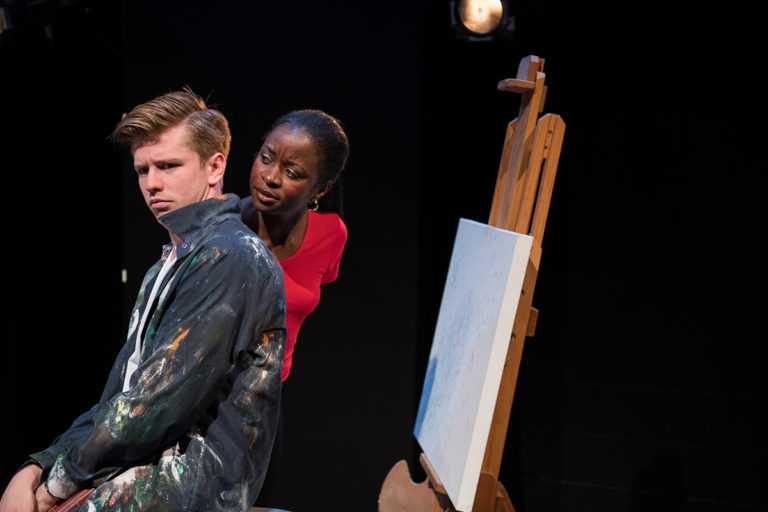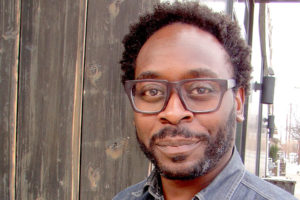‘White’ Challenges Privilege in Shotgun Players’ Comedy
Jul 14, 2018
Posted in Arts and Culture

Adam Donovan as Gus and Santoya Fields as Vanessa star in the West Coast premier of “White.” Photo by Ben Krantz Studio.
By Wanda Ravernell
White Fragility is getting its comeuppance as ‘BBQ Becky,’ ‘Pool Patrol Paula,’ ‘Permit Patty’ and their ilk lose face and livelihoods for calling police on Black people while barbecuing, swimming, selling water on a hot day or otherwise minding their business.
It’s a perfect time for Shotgun Players Theater’s West Coast premiere of “White,” a 2015 play by James Ijames, a prolific black author from Philadelphia.
In what director M. Graham Smith calls “a comedy with consequences” “White” can be characterized as a warped “Pygmalion” or “Frankenstein’s Monster” where a black woman outmaneuvers a white man at his own game.
Opening July 13 in Berkeley, the play stars Adam Donovan as Gus, a gay, white artist who is hurt when his museum curator friend Jane (Luisa Frasconi) won’t include him in a prestigious show.
Refusing to be thwarted, Gus hires Vanessa, a black actress portrayed by Santoya Fields to take on an unconventional role.

Ijames was inspired to write ‘White’ because of a 2014 controversy at New York’s Whitney Museum where a white artist hired Black actors, making them the visible enactors of a piece he created.
The question then, (and now, in “White,”) was how is racial/ethnic inclusion accomplished? How is art decreed as Black? Or, as anthropologists might put it, Who has agency here?
Is “White”’s Vanessa inhabiting her own mind and body or is it really Gus whose the driving force using Vanessa for self-serving reasons?
The coping mechanisms of bitter humor and scathing insight that Black people have used over scores if not hundreds of years are vividly expressed under Ijames capable writing.
Those old mechanisms have new terminologies: ‘Code-switching,’ refers to what W.E.B. DuBois and others called ‘double-mindedness; or ‘twin-ness.’ ‘White privilege’ is a much better term for ‘double-standard’ and ‘micro-aggressions’ are general pettiness. And BBQ Becky, Permit Patty and Pool Patrol Paula are now publically shamed on social media where the knowing laughter and scorn once heaped on delicate Miss Anne and wicked Mr. Charlie was done behind closed doors.
In the play, the ‘joke,’ so to speak, is definitely on white people, but for Assistant Director Samira Mariama “White” also validates black people’s experience with white privilege.
Vanessa’s role, says Mariama, demonstrates the tedium racial minorities endure as they navigate a sea of whiteness and exposes its ugliness. The consequences Smith referred to are the choices white people have to make.
“This is not just a matter of ‘I’ll be nicer to my Black friends,’ or ‘I’ll go to a Black show,’ said Mariama, a recent UC Berkeley grad who was hand-picked by veteran director Smith to assist him and also understudy the role of Vanessa. “No. We’ve called (whiteness) out.”